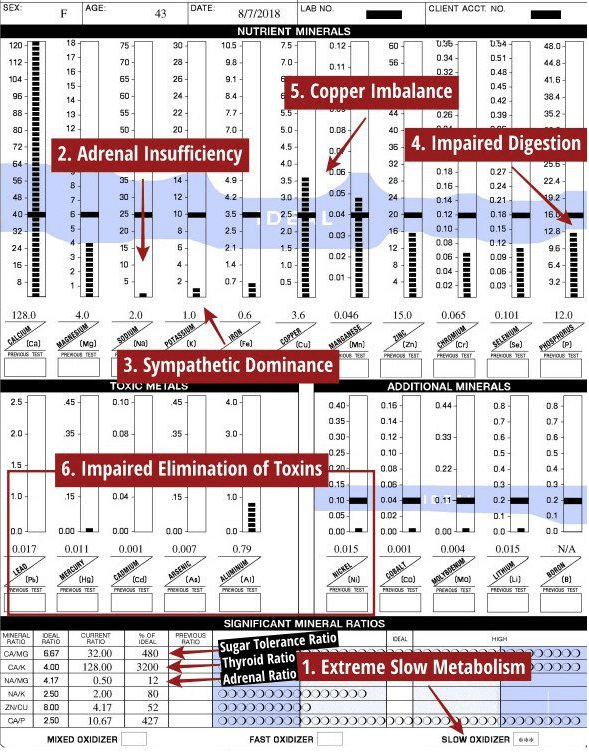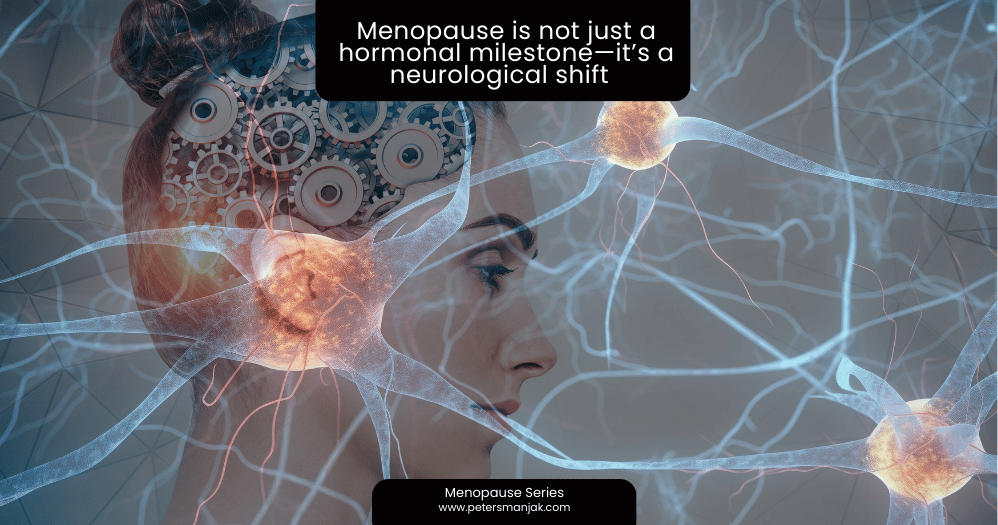When it comes to addressing persistent fatigue and low energy, few diagnostic tools offer the insights of Hair Tissue Mineral Analysis (HTMA). This non-invasive test measures the mineral content of your hair and reveals potential causes of chronic fatigue that may not appear on conventional blood tests for years.
In this article, I’ll share insights from Emily’s hair analysis to show how HTMA can uncover key energy imbalances. I’ll also provide an overview of how restoring these imbalances can help reclaim health and vitality.
Meet Emily
Emily, a 43-year-old single mother, was diagnosed with Chronic Fatigue Syndrome and Fibromyalgia in 2014. Her long list of symptoms included persistent fatigue, frequent headaches, muscle pain, skin rashes, and difficulty tolerating stress. She also reported sweet cravings, heart palpitations, sinus congestion, brain fog, and recurring yeast infections. Winters were particularly challenging as she often felt cold and drained.
She struggled with severe PMS, mood swings, and periods of irritability, anxiety, and depression. Her active, racing mind often left her exhausted yet unable to relax. Despite seeing several doctors and undergoing numerous tests, no clear cause was identified. “I was told I was fine or depressed and needed antidepressants,” Emily said. Seeking answers, she turned to hair mineral analysis, which provided the clarity she needed.

Emily’s First Hair Analysis
Emily’s HTMA revealed six key issues affecting her energy production:
- Very Slow Metabolism
- Adrenal Insufficiency
- Sympathetic Dominance
- Impaired Elimination of Toxins
- Impaired Digestion
- Lowered Immunity
Let’s explore these findings in detail and compare what an ideal energy system looks like.
1. Very Slow Metabolism
Emily’s test showed an extremely slow metabolic rate, reflecting advanced stress-related exhaustion and reduced thyroid and adrenal activity.
Unbalanced Reading: A slow metabolism indicates severe energy depletion and can cause symptoms such as fatigue, depression, hypoglycemia (low blood sugar), sweet cravings, weight gain, and low body temperature. Long-term, it may increase the risk of osteoporosis, skin issues, and other age-related conditions.
Ideal State: In contrast, a healthy metabolic rate promotes steady energy production, supports efficient thyroid and adrenal gland function, and ensures proper nutrient absorption. Individuals with balanced metabolism experience stable moods, healthy weight regulation, and the ability to handle stress without crashing.
2. Adrenal Insufficiency
Emily’s low sodium and potassium levels were telltale signs of adrenal fatigue. The adrenal glands play a crucial role in maintaining energy and responding to stress by producing essential hormones.
Unbalanced Reading: Adrenal insufficiency can result in extreme fatigue, low blood sugar, cold intolerance, poor circulation, low blood pressure, allergies, and reduced stamina. For women, this condition may exacerbate PMS or menopausal symptoms such as hot flashes and irritability.
Ideal State: Proper adrenal function allows the body to produce sufficient hormones to maintain stable energy levels and effectively cope with stress. Healthy adrenal glands support good circulation, normal blood pressure, and enhanced resilience to both physical and emotional challenges.
3. Sympathetic Dominance
Emily’s analysis revealed an overuse of her sympathetic nervous system, also known as the “fight-or-flight” response. This state is common among individuals with high stress and fast-paced lifestyles.
Unbalanced Reading: Living in a state of sympathetic dominance depletes the body’s energy reserves, disrupts recovery, and leads to constant fatigue. It can cause symptoms like anxiety, irritability, insomnia, and difficulty concentrating.
Ideal State: A balanced autonomic nervous system shifts seamlessly between the sympathetic (stress response) and parasympathetic (rest and repair) states. This equilibrium ensures proper regeneration, a calm mind, and optimal energy levels throughout the day.
4. Impaired Elimination of Toxins
Emily’s test showed low levels of toxic metals, which might seem positive at first glance. However, this finding suggested that her body lacked the energy to eliminate stored toxins, allowing them to accumulate in tissues.
Unbalanced Reading: Toxins such as aluminum disrupt enzyme activity, interfere with energy production, and contribute to worsening fatigue. Over time, they may exacerbate chronic conditions and further deplete energy reserves.
Ideal State: A healthy body actively eliminates toxins, supported by efficient energy production and robust detoxification systems. Adequate elimination reduces the toxic burden, enhances cellular function, and promotes better energy and overall health.
5. Impaired Digestion
Several markers on Emily’s test indicated digestive impairment, including low phosphorus levels. Proper digestion is essential for breaking down nutrients and producing ATP, the body’s main energy molecule.
Unbalanced Reading: Impaired digestion slows protein synthesis, leading to low energy, reduced enzyme activity, and hormonal imbalances. Conditions like candida overgrowth or low stomach acid can worsen this issue, causing bloating, nutrient deficiencies, and chronic fatigue.
Ideal State: Efficient digestion ensures the proper breakdown and absorption of nutrients, enabling the body to produce sufficient ATP. A healthy digestive system supports high energy levels, stable hormones, and effective immune function.
6. Lowered Immunity and Chronic Infections
Emily’s sodium-to-potassium ratio was low, signaling reduced immunity and a susceptibility to chronic infections. She had a history of viral infections, including Epstein-Barr virus, which left her bedridden during a reactivation episode.
Unbalanced Reading: Compromised immunity leads to frequent infections, prolonged recovery, and heightened fatigue. Chronic viral, bacterial, or fungal infections can deplete the body’s energy reserves and exacerbate other health issues.
Ideal State: A strong immune system defends against infections and allows for rapid recovery. Balanced mineral levels support proper immune responses, reducing fatigue and enhancing resilience against illness.
An Enlightened Moment
“The hair analysis results amazed me,” Emily shared. “It explained so much about my symptoms and matched my other test results perfectly. I became a believer in its accuracy and wish I’d known about it earlier—it would’ve saved me so much time and money!”
Why Didn’t These Imbalances Show Up on Blood Tests?
Blood tests showed normal mineral levels for Emily, while her hair analysis revealed significant imbalances. This occurs because the body prioritizes maintaining mineral levels in the blood at the expense of tissues. Hair analysis provides a window into tissue-level imbalances, often uncovering issues years before they become apparent in blood work.
Using Hair Analysis to Restore Energy
Hair mineral analysis isn’t just a diagnostic tool—it provides actionable insights for recovery. A trained practitioner can use your results to create personalized dietary, supplement, and lifestyle recommendations to rebuild your energy systems.
If you’re struggling with chronic fatigue and seeking answers, hair mineral analysis could be a transformative tool for identifying root causes and guiding you toward renewed energy and vitality.
All information in this article is for educational purposes only. It is not for the diagnosis, treatment, prescription, or cure of any disease or health condition.








